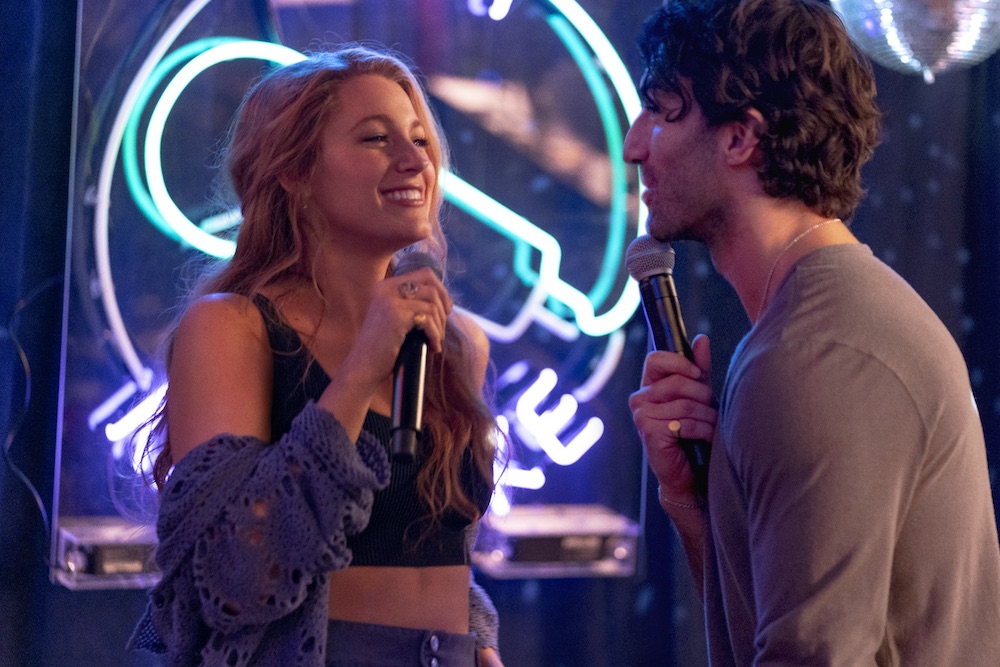An outstanding romantic or dramatic film succeeds because it never gets too hammy, corny, or maudlin. It shouldn’t come across as a piece of theatrical drama or romance but should feel genuine, organic, tactile, and steamy. It Ends With Us isn’t an outstanding example of this cinematic accomplishment. Still, it works when portraying romantic chemistry and dramatic gravity.
Based on the successful novel (of the same name) by Colleen Hoover, the film follows the mostly pained life of one Lily Bloom (Blake Lively/Isabela Ferrer). The film begins with Lily returning to her hometown of Plethora, Maine, which she has avoided for some time. What brings her back is the funeral of her father, Andrew (Kevin McKidd), and the opportunity to reconnect with her mother, Jenny (Amy Morton).
The visit to her hometown proves to be as challenging as Lily expected, as the funeral and other time spent there drudges back horrible memories, as her father was physically abusive towards her mother. On the other hand, she still clings to the fond memories of her teen romance with her “neighbor” and schoolmate, Atlas Corrigan (Alex Neustaedter). However, that love story ended years ago, and Lily is ready for a fresh start.
This plan involves moving to Boston, where she opens a flower shop where she can express her love and appreciation for plant life. The strategy doesn’t include meeting a handsome and charming neurosurgeon named Ryle Kincaid (Justin Baldoni). The two begin a fiery romance that eventually culminates in marriage. However, as Lily spends more time with Ryle, she starts discovering a raging, violent side to his personality that reminds her of her father.
With an adapted screenplay by Christy Hall, director/lead male actor Justin Baldoni has created a solid movie from Hoover’s source material. I have never read the original novel, but I chuckled at some of the character name choices- a florist named Lily Bloom, a neurosurgeon named Ryle Kincaid, and a love interest from the past named Atlas Corrigan. Seriously, who names their boy Atlas?! Once I got past these laughable choices, I managed to get caught up in the heated romance, tragic past, and the impending doom of Lily Bloom’s future.
Once the abusive behavior begins, the film is at its most compelling. The filmmakers handle this material and its overall message very well. The film has some hackneyed and silly moments here and there, but thankfully, they never totally derail the overall experience. I am quite grateful that this movie never becomes a full-on soap opera, which would have been a disappointment.
A fine cast of talented actors helps to save the movie, keeping the events mostly grounded in reality. As the adult version of Lily, Blake Lively gives a resolute but also genuinely affecting performance. At the beginning of the movie, Lily has a palpable drive and strength to move forward, but she gets floored by romance and then floored again, in a different way, when violence and abuse enter her life again.
I was also impressed by the cast, who brought their characters to life with skill and dedication. Isabella Ferrer, who portrays Lily during her teen years, delivers a compelling performance. Justin Baldoni, who also directs the movie, gives an admirable turn as the charming but troubled Ryle. The film also features solid work by Brandon Sklenar, Amy Morton, Jenny Slate, and Hasan Minhaj, who all contribute to the film’s success.
It Ends With Us opens in theaters this weekend and is a film I moderately recommend. I don’t suggest spending top dollar to watch it, but it makes for either a fine matinee or an even better movie at home once it is available for streaming.
